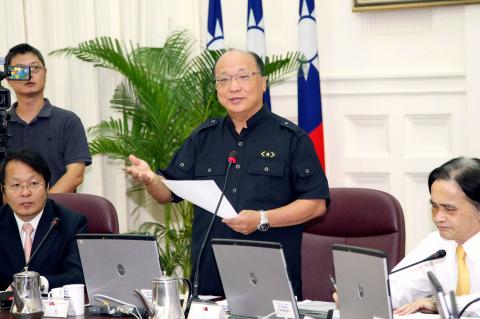Taichung Mayor Jason Hu (胡志強) yesterday said the city government would no longer brook references to the city as a “center of crime,” citing the city’s improved national crime ranking from June to last month.
Hu said during a city government meeting about public order that Taichung ranked 12th among cities and counties in the nation in terms of the number of new crime cases per 100,000 residents for four consecutive months from June to September.
For a number of years under Hu, the city had the most new crime cases per 100,000 residents.

PHOTO: CHANG CHIN-YA, TAIPEI TIMES
Most cases were major threats to the population, including burglary, robbery and fraud.
From January to last month, the city ranked fourth in the nation, with 757.76 crimes per 100,000 residents.
However, because Taichung’s ranking dropped to 12th from June to last month, Hu said public order in the city had “come to the middle” and, as a result, he could no longer accept criticism of poor public order.
However, the mayor’s enthusiasm — about one month before the special municipality elections — was met with skepticism.
Calling on Hu not to play with the numbers, Taichung City Councilor Chang Yao-chung (張耀中) said the city’s residents knew very well whether the crime situation in -Taichung had improved.
Five out of 10 residents randomly sampled would tell the mayor that they or their family and friends have been victims of theft, fraud or robbery, Chang said, adding that a woman was also -recently robbed and injured in broad daylight.
Taichung City Councilor Tseng Chao-jung (曾朝榮) said government leaders should make every effort to obtain firsthand information from residents regarding their perceptions of public order.
The city still has more cases of theft, break-ins and robbery than any other place in the nation, Tseng said, adding that -Taichung residents did not seem to feel that public order had improved, despite the mayor’s claims.
Problems with the city’s public order will never improve if the mayor’s only concern is an improvement in the city’s so-called ranking, Tseng said.
Earlier this year, Taichung City Police Commissioner Hu Mu-yuan (胡木源) resigned to take responsibility for poor social order and embarrassing revelations that -police officers had been very close to underworld figures during an investigation into the murder of an alleged gang leader, Weng Chi-nan (翁奇楠), on May 28.
Soon after Hu Mu-yuan’s resignation, the mayor said he was determined to deal with the so-called “eight categories of special businesses” that are regarded as covers for criminal activities.
“As mayor of this city, I will not back down from a war against gangsters even if my life is -threatened,” Jason Hu said.
The eight categories refer to entertainment-related businesses, such as KTV clubs, saunas, night clubs, barber and massage shops, dance halls, discotheques and tea houses, many of which are said to be run by criminal groups.
Given its central location and ease of access, Taichung has long held the unenviable reputation of serving as headquarters for criminal organizations.
ADDITIONAL REPORTING BY STAFF WRITER

A preclearance service to facilitate entry for people traveling to select airports in Japan would be available from Thursday next week to Feb. 25 at Taiwan Taoyuan International Airport, Taoyuan International Airport Corp (TIAC) said on Tuesday. The service was first made available to Taiwanese travelers throughout the winter vacation of 2024 and during the Lunar New Year holiday. In addition to flights to the Japanese cities of Hakodate, Asahikawa, Akita, Sendai, Niigata, Okayama, Takamatsu, Kumamoto and Kagoshima, the service would be available to travelers to Kobe and Oita. The service can be accessed by passengers of 15 flight routes operated by

Chinese spouse and influencer Guan Guan’s (關關) residency permit has been revoked for repeatedly posting pro-China videos that threaten national security, the National Immigration Agency confirmed today. Guan Guan has said many controversial statements in her videos posted to Douyin (抖音), including “the red flag will soon be painted all over Taiwan” and “Taiwan is an inseparable part of China,” and expressing hope for expedited reunification. The agency last year received multiple reports alleging that Guan Guan had advocated for armed reunification. After verifying the reports, the agency last month issued a notice requiring her to appear and explain her actions. Guan

GIVE AND TAKE: Blood demand continues to rise each year, while fewer young donors are available due to the nation’s falling birthrate, a doctor said Blood donors can redeem points earned from donations to obtain limited edition Formosan black bear travel mugs, the Kaohsiung Blood Center said yesterday, as it announced a goal of stocking 20,000 units of blood prior to the Lunar New Year. The last month of the lunar year is National Blood Donation Month, when local centers seek to stockpile blood for use during the Lunar New Year holiday. The blood demand in southern Taiwan — including Tainan and Kaohsiung, as well as Chiayi, Pingtung, Penghu and Taitung counties — is about 2,000 units per day, the center said. The donation campaign aims to boost

The Central Weather Administration (CWA) said a magnitude 4.9 earthquake that struck off the coast of eastern Taiwan yesterday was an independent event and part of a stress-adjustment process. The earthquake occurred at 4:47pm, with its epicenter at sea about 45.4km south of Yilan County Hall at a depth of 5.9km, the CWA said. The quake's intensity, which gauges the actual effects of a temblor, was highest in several townships in Yilan and neighboring Hualien County, where it measured 4 on Taiwan's seven-tier intensity scale, the CWA said. Lin Po-yu (林柏佑), a division chief at the CWA's Seismological Center, told a news conference